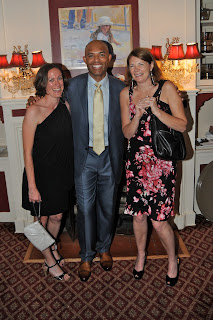--
Mark Cramer
On Sept. 8, Alan Kennedy and I will be off on a 100-mile charity bike ride to support research on two related incurable diseases that receive little public attention. We will follow the wild Loire River through castle country, from Orléans to Tours. In Tours we’ll attend a country race meet on Sept. 9, whose amazing card includes three genres of races: thoroughbreds, hurdlers and trotters.
On Sunday, Oct. 7, we’ll add the second and final leg of the journey, culminating with our arrival at Longchamp in Paris, for the world’s most prestigious horse race, the Prix de l’Arc de Triomphe.
Alan is an art curator and specialist in Asian art who finds poetry in horse racing and bicycling. I’ve been a writer of books on horse racing, travel and fiction, and I work as a racing journalist and university teacher.
If you cannot join us in person, we hope you’ll contribute to the cause:
http://2012defimici.alvarum.net/markcramer
IBDs (inflammatory bowel diseases) such as Crohn’s and ulcerative colitis, arise from an inappropriate
immune response against substances and tissues normally present in the body. In other words, the immune system mistakes some part of the body as a
pathogen and attacks its own cells.
People with IBDs can lose their jobs and the joys of leisure activities, and, in extreme cases, lose their intestines.
Medications can put the disease in remission for some patients, but not without problematic side-effects. The race is on. The sooner researchers come up with a cure, or at least more dependable ways to put the disease in remission, the more the victims will be spared from the dire consequences of IBDs.
One of those victims happens to be my son. He’s philosophical about his illness and has asked me to not use emotionalism to promote this cause. But the message needs to get out. You will never see a movie character with Crohn’s disease or ulcerative colitis. IBDs are not trendy enough to trigger unsolicited donations.
What do autoimmune diseases have to do with horse race handicapping?
Before we had ever heard of ulcerative colitis, we moved to a city just north of Paris. By pure coincidence, before knowing our son would be stricken, we had chosen an apartment across the street from a hospital which, as it turned out, has one of the world’s best facilities for treatment of IBDs.
When the simple and more benign treatments did not work for our son, the team of doctors sent him home with a pile of "past performances," consisting of information and statistics on potentially successful medications. When I began reading these documents, taking notes, looking for the pros and cons, my wife said that it looked as if I were handicapping a horse race.
In fact, she was right. The process is quite similar. (One of the best horse race handicappers I know happens to also be a successful medical researcher.)
Not one of the medications was a lock. I found myself making a morning line. The raw percentages and narrative in the documents were not enough for a clear choice. Then there were potentially serious side effects to consider. We ended up choosing a medication which was particularly able to suppress one aspect of the immune system with minimal effects on the others.
Infusions of this medication put the disease into remission, and our son was able to live normally and hold a job. But after a few months, he suffered a violent allergic attack; the doctors suspended the medication. Suddenly, we were pouring over another "field" of medications, spread out before us like racing pages. I argued for one of them in particular because it functioned like his previous medication but with a lower probability of side effects.
This new medication was a longshot. At the time, it had not shown any conclusively success in tests of patients with ulcerative colitis. However, there were successful results for Crohn’s disease. The doctors went along, telling us they had also "handicapped" in favor of the same choice.
Our son had to inject this medication every two weeks, but it worked. He was able to hold his job and the remission continued. He moved back to his own apartment, kept his job for more than a year and a half, and received a raise. We thought we had a winning "system". But there was another violent allergic reaction and the treatment was discontinued.
Within a short time our son was once again getting painful and debilitating intestinal flare-ups. He had to ask for extended sick days from his workplace. We were back to square one.
Most of the medication alternatives offered were no better than 8-1 in the morning line. Instead, we chose a 50-1 longshot, a medication that had no proven track record and was in Phase 2 of research (clinical trials in humans progress through three stages). This particular medicine did have proven success with other autoimmune diseases, but not yet the one our son has. Phase 1 study results had been promising.
However, there was a catch. Since this is only Phase 2 of the research, our son can only take the medication for a few months. During this time, neither he nor his doctors are told whether he is one of the 67% of study participants receiving the real medication, or one of the 33% getting a placebo.
Meanwhile, he’s been able to go back to work part-time. The company understands that if he has to take a break because of a flare-up, he simply stays later to make up for the lost time. He’s fortunate. Many victims of IBD end up losing their jobs.
You might ask how we, the handicappers, could have chosen a medication that might be a placebo and that, even if successful, would be discontinued after the trial period. We understood that there are other medications currently in testing that work in a similar fashion, so if this one does indeed work well, he’ll have better odds in the near future.
There is no "cure" for most autoimmune diseases but medical research provides hope. For this reason, Alan and I are asking you to support our bike trip by sending a donation to support research into for inflammatory bowel diseases (Crohn’s and UC). The association we have chosen to support, called AFA (Association François Aupetit), is a French non-profit that finances research and helps people cope with IBD. Though this is a French association, research is worldwide, and AFA is associated with the international community of medical researchers. Our son, for example, is participating in a test for a product being developed by an American pharmaceutical company.
There are no borders when it comes to medical knowledge.
Those who suffer from inflammatory bowel diseases must handicap the past performances of possible medications and choose the one with the best possible return on health investment. They are engaging in calculated risk, just as we do at the track. Provided we are not betting the mortgage money, our risk at the track is considerably less frightening than that of choosing a medication that may or may not win.
Alan and I will be making a wager at each of the two tracks visited, symbolizing the uncertainty of choosing treatments for IBDs. If we win, the proceeds will be added to the pool of donations.
Since the Arc de Triomphe is simulcast in the USA, we will let you know our exotic wager for the IBD charity on this blog and you can follow the bet.
We hope you will support our race against IBD diseases by making a donation. Here’s the link:
http://2012defimici.alvarum.net/markcramer
Click on the upper right, which will either say DONATE or FAIRE UN DON in French. If the next page comes up in "français" (upper right hand corner), just click on the down arrow next to "français" and you will have the English-language version. The instructions are simple. (At this writing, 10 Euros is 12.55 US$ and that exchange rate has not been fluctuating too much of late.)





















